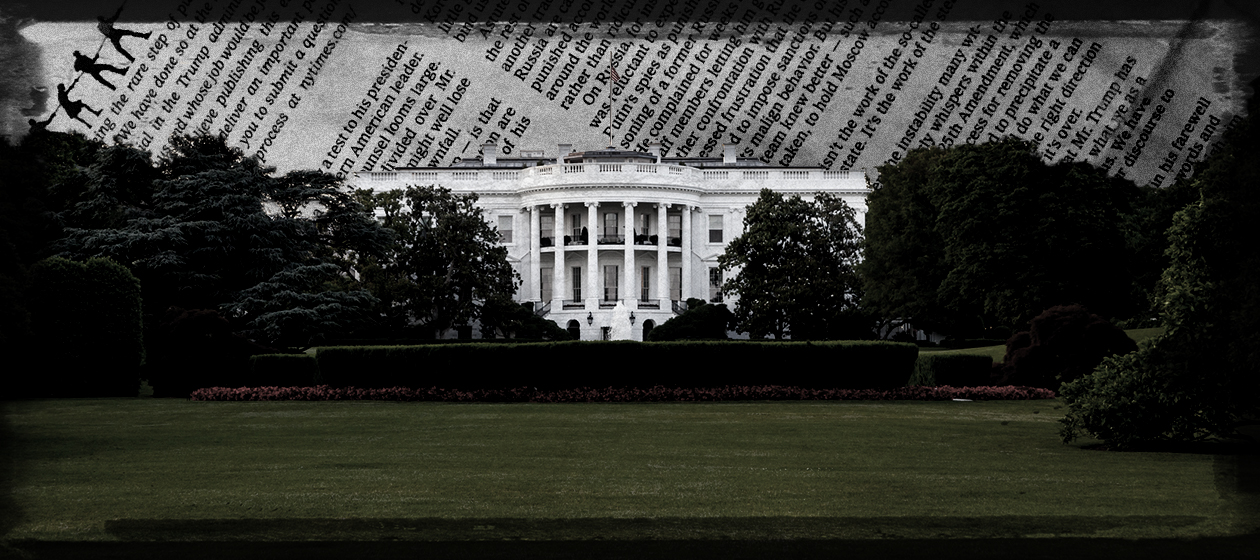How the 'resistance' in the White House threatens American democracy
Don't cheer these self-proclaimed "unsung heroes" quietly thwarting President Trump from within his own administration. They are a grave danger to our nation.


The "senior official in the Trump administration" who penned the anonymous New York Times op-ed would like us to believe that those actively subverting the will of the president of the United States are "unsung heroes" for their acts of "quiet resistance." It's more accurate to describe them as unelected and unaccountable apparatchiks from the Republican establishment out to rein in the man who won a democratic election because on some issues his instincts diverge too sharply from a party orthodoxy that can no longer prevail at the ballot box.
That makes them fomenters of a soft coup — and quite possibly a greater threat to democracy in America than the virtual tyrant in the Oval Office.
From the very beginning of the Trump administration, its critics have expressed a fear of creeping authoritarianism. He's a would-be fascist, they said. He displays contempt for the rule of law. He spews lies and venomous hatred at anyone who provokes him. He disdains a free press, describing journalists and reporters as "enemies of the people."
The Week
Escape your echo chamber. Get the facts behind the news, plus analysis from multiple perspectives.

Sign up for The Week's Free Newsletters
From our morning news briefing to a weekly Good News Newsletter, get the best of The Week delivered directly to your inbox.
From our morning news briefing to a weekly Good News Newsletter, get the best of The Week delivered directly to your inbox.
All of this is true, and all of it is deeply worrying.
But there is more than one path to authoritarianism.
In the Times op-ed published on Wednesday, as in the excerpts from Bob Woodward's forthcoming book published by The Washington Post the day before, we can catch a glimpse of one such alternative road from democracy to despotism — one in which the president's manifest unfitness for his job is used as a pretext by unelected members of the administration to wrest power away from him and deploy it to pursue policies at odds with his preferences.
The author of the op-ed tries to justify efforts of some within the administration at "thwarting Mr. Trump's more misguided impulses" in terms of a dire threat to the country. "The root of the problem is the president's amorality," the author writes. His "leadership style" is "impetuous, adversarial, petty, and ineffective." He's wildly erratic, with impulsiveness resulting in "half-baked, ill-informed, and occasionally reckless decisions that have to be walked back," as well as flip-flops that leave the White House reeling at major reversals of policy from day to day and week to week.
A free daily email with the biggest news stories of the day – and the best features from TheWeek.com
It sounds awful, and extremely dangerous — exactly the kind of situation that would seem to call for the constitutional removal of the president (under Section 4 of the 25th Amendment) on grounds of incapacity. But this is not what the author of the op-ed advocates. Neither does he suggest following the much less daunting path of urging support for Democrats in the upcoming midterm elections in order to make it possible for Congress to impeach and remove the president as quickly as possible.
Rather, the author of the op-ed defends an alternative tactic that has apparently been pursued for quite some time among certain members of the White House staff and across a number of executive branch departments and agencies — which is simply to ignore the president, disregard his instructions, lie to him, and pursue alternative policies behind his back.
The op-ed focuses on foreign policy. The president is openly hostile toward our allies and obsequious to dictators, and none more so than Russia's Vladimir Putin. Rejecting this approach, the administration has been pursuing a two-track foreign policy, with the Defense Department, State Department, U.N. ambassador, and others within the administration undercutting the president whenever possible.
In the Woodward excerpts published in the Post, this insubordination extends to the four-star general who runs the Defense Department and explicitly ignored the president's expressed desire to kill Syrian dictator Bashar al-Assad — and to the White House's former chief economic advisor Gary Cohn stealing a document off the president's desk in order to prevent him from scuttling a major trade agreement with South Korea.
The president may well be ill-informed, uneducable on policy details, impulsive, mean-spirited — in other words, temperamentally and intellectually unsuited to the office he holds. But none of these examples of "quiet resistance" grow out of those concerns. They're an expression of disapproval of what the president wants to do — and a vivid demonstration of a willingness to defy it.
The point isn't that Trump's priorities are sensible. There's a strong case to be made for the international alliance system. There's an abundance of evidence that Putin is a thug who is doing everything in his power to spread chaos throughout the Western world. Assassinating Assad would be supremely risky. Most economists agree that fomenting trade wars across the globe is ill-advised.
But those who disagree with these Trump priorities weren't elected president. That includes the officials actively undermining the president's agenda and then bragging about it in the pages of a newspaper or spilling it to a reporter out to make a splash.
The message telegraphed in these self-aggrandizing statements isn't that Trump is a fundamental threat to the well being of the United States and the world and so must be removed from office. The message, instead, is: "Some of the president's instincts are good — tax cuts, deregulation, judges. In those areas, we'll work with him to get as much done as we can, and we already have, to great effect. As for the rest, we can handle it. We've got this. We won't let the bad stuff happen."
But just what is the bad stuff? The policies that diverge from the Republican Party line since Reagan. That's the real meaning of the author's lament about the president's "amorality." The point isn't primarily that Trump is fundamentally corrupt or unmoored from ordinary moral considerations, although both are obvious to any casual observer. The point is that he's a bad Republican. As the author writes in what is meant to be the most damning indictment of all: "Although he was elected as a Republican, the president shows little affinity for ideals long espoused by conservatives: free minds, free markets, and free people."
Donald Trump is an ideological heretic. He simply must be stopped.
The fact that many of Trump's left-leaning critics will sympathize with the aims of the coup-plotters should not blind them to what is going on and its implications for the future of American politics. What if a future progressive president found herself actively undermined by unelected members of her own administration who consider it unacceptable to devise a system of socialized medicine, raise taxes on the wealthy, cut military spending, or speak and act more critically toward Israel?
Maybe events wouldn't unfold that way on the other side of the spectrum. Perhaps the Trump administration's insubordination problem is mainly a function of the president's uniquely high level of incompetence. If he had the slightest idea of what he was doing, he'd be able to take charge and keep control of his own agenda, rendering impotent the ambitions of his ideological opponents inside the administration.
That may well be true. Yet the fact remains that the supposedly sensible center of the Republican Party — those who close their anonymous op-eds about actively subverting the president by praising the example of the Late Great John McCain — has apparently decided that toeing the ideological line is more important than honoring the outcome of a democratic election.
Where American democracy goes after that is anyone's guess. But it's unlikely to be anywhere good.
Damon Linker is a senior correspondent at TheWeek.com. He is also a former contributing editor at The New Republic and the author of The Theocons and The Religious Test.
-
 The week’s best photos
The week’s best photosIn Pictures A drive in the desert, prayers with pigeons, and more
-
 The Week Unwrapped: Will drought fuel global violence?
The Week Unwrapped: Will drought fuel global violence?Podcast Plus why did Trump pardon a drug-trafficking president? And are romantic comedies in terminal decline?
-
 Crossword: December 5, 2025
Crossword: December 5, 2025The daily crossword from The Week
-
 Has Zohran Mamdani shown the Democrats how to win again?
Has Zohran Mamdani shown the Democrats how to win again?Today’s Big Question New York City mayoral election touted as victory for left-wing populists but moderate centrist wins elsewhere present more complex path for Democratic Party
-
 Millions turn out for anti-Trump ‘No Kings’ rallies
Millions turn out for anti-Trump ‘No Kings’ ralliesSpeed Read An estimated 7 million people participated, 2 million more than at the first ‘No Kings’ protest in June
-
 Ghislaine Maxwell: angling for a Trump pardon
Ghislaine Maxwell: angling for a Trump pardonTalking Point Convicted sex trafficker's testimony could shed new light on president's links to Jeffrey Epstein
-
 The last words and final moments of 40 presidents
The last words and final moments of 40 presidentsThe Explainer Some are eloquent quotes worthy of the holders of the highest office in the nation, and others... aren't
-
 The JFK files: the truth at last?
The JFK files: the truth at last?In The Spotlight More than 64,000 previously classified documents relating the 1963 assassination of John F. Kennedy have been released by the Trump administration
-
 'Seriously, not literally': how should the world take Donald Trump?
'Seriously, not literally': how should the world take Donald Trump?Today's big question White House rhetoric and reality look likely to become increasingly blurred
-
 Will Trump's 'madman' strategy pay off?
Will Trump's 'madman' strategy pay off?Today's Big Question Incoming US president likes to seem unpredictable but, this time round, world leaders could be wise to his playbook
-
 Democrats vs. Republicans: who are US billionaires backing?
Democrats vs. Republicans: who are US billionaires backing?The Explainer Younger tech titans join 'boys' club throwing money and support' behind President Trump, while older plutocrats quietly rebuke new administration
